Hundreds of opponents of President Donald Trump gathered Saturday, filling up sidewalks in downtown Belleville and O'Fallon to speak out against policies they say are harmful.
Among their demands were that members of Congress not go through with the Trump administration's proposed spending cuts, which could affect public education. Medicaid programs .
The Belleville and O'Fallon demonstrations were among more than 1,500 across the country against a litany of what protesters argue are authoritarian actions by Trump. They scheduled the "No Kings" protests to coincide with a major military parade in Washington marking the Army's 250th anniversary.
National organizers of the No Kings Day of Defiance accused Trump of turning the D.C. parade into a celebration of himself for his 79th birthday, which was also Saturday. Organizers characterized it as a wasteful display of power. The Army has estimated that the event could cost between $25 million and $45 million .
Protesters were encouraged to display American flags because June 14 is also Flag Day.



Peggy Glatz, the organizer of the online event page for the Belleville protest, said 482 people registered to attend, but attendees estimated that 600 or more showed up at the Public Square. In O'Fallon, event page organizer Leslie Wolter said the protest attendance exceeded the 271 people who registered online.
Among the metro-east protesters were supporters of unions for educators, carpenters, and auto workers. On Saturday morning in Belleville, Illinois, Education Association union staffer Eric Scott led protesters in "an old union chant."
"Who's got the power? We've got the power. What kind of power? People power."
The atmosphere was hopeful.
Belleville protester Connie Turpin said she thinks public pressure has already gotten Trump to back off of unpopular immigration raids at farms, meatpacking plants, hotels, and restaurants. She is a member of Southwestern Illinois Democratic Women.
A few downtown Belleville drivers made disparaging remarks and gestures to the crowd. One held a Trump flag out the window. But protesters were met mostly with cars honking in support as they traveled through the traffic circle.
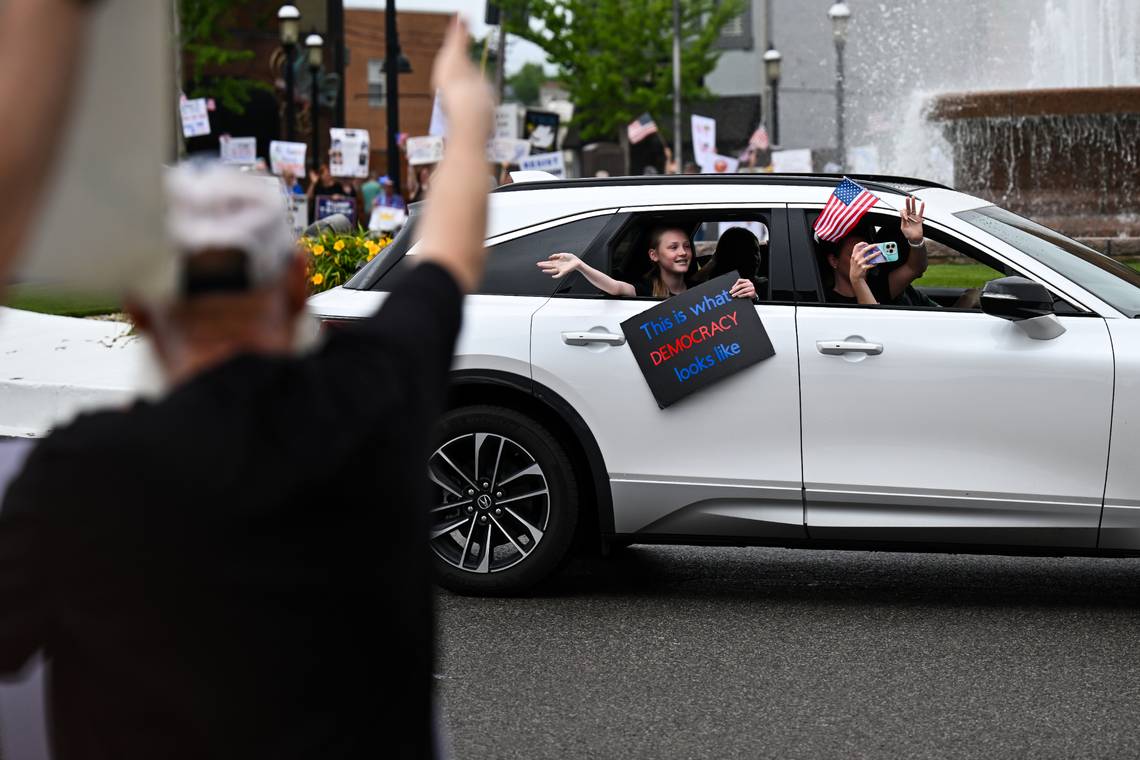
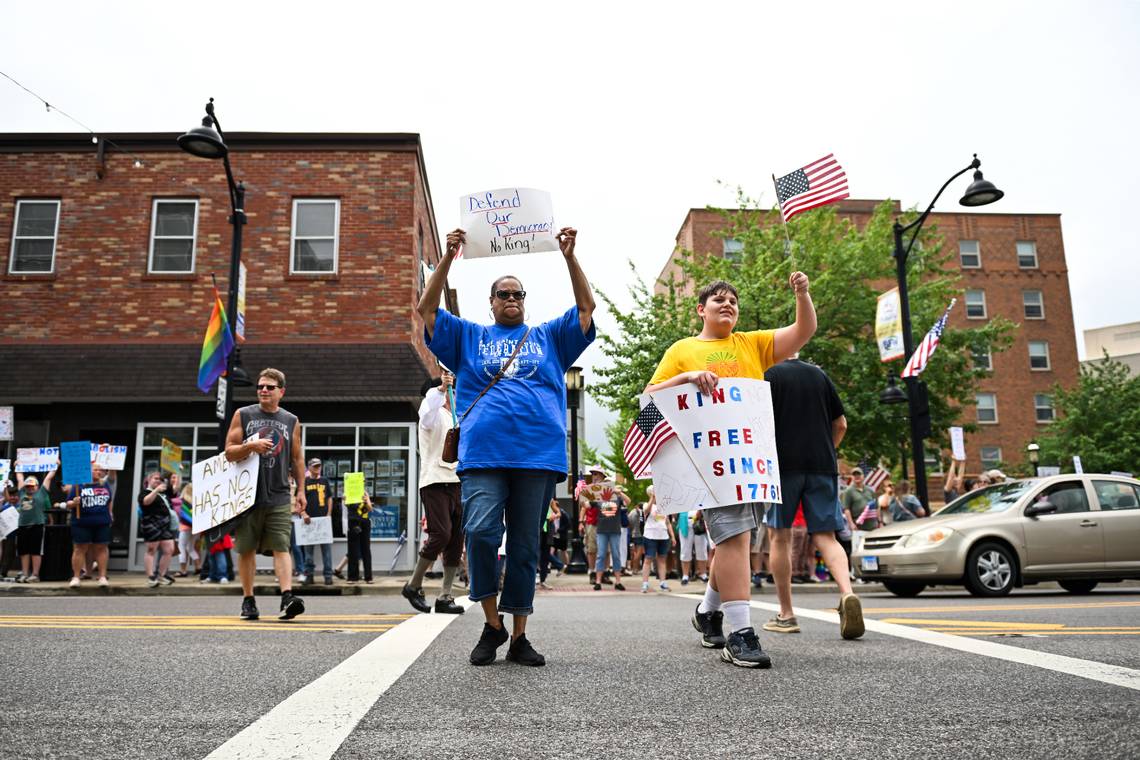

O'Fallon protesters Abby Byer and Karen Sanders each said they were happy to see diversity in the crowd near City Hall.
"This is refreshing to see people standing united, old and young, all colors, different ideas but the same mindset that we make this country great," said Sanders, a native of Columbia, Missouri, who now lives in Georgia and was in the area visiting family. She said she is a 30-year union member with the United Auto Workers.
Cuts to education funding
Barbara Outten, a math and science teacher in East St. Louis District 189, said she was protesting on Saturday for the students who would be affected by the proposed changes. cuts to federal education funding She encouraged other members of the teachers' union to attend Belleville's protest.
The fiscal year 2026 budget proposal includes a 15 percent cut to the U.S. Education Department.
We teach the whole child in East St. Louis, and that requires us to have social workers, counselors, bilingual teachers, special education teachers, and along with those folks, the aides that help support and give every child in our district what they need to be successful," Outten said. "And we have made gains since COVID, having these people in place.
Now, if you take this funding away from us, that means larger class sizes and many of those people who support these children and help them be equal to every other child in this nation will be gone. And it's not acceptable.
LaTosha Mackins, an East St. Louis science teacher, noted that students also risk losing an after-school program that provides tutoring and other services, plus meals.
"Sometimes that may be the only meal that the kids get until the next school day, and with the budget cuts right now it's up in the air whether that program is coming back because it's federally-funded," she said. "So I'm here to support my students and let (lawmakers) know that this is affecting students and not in a good way."
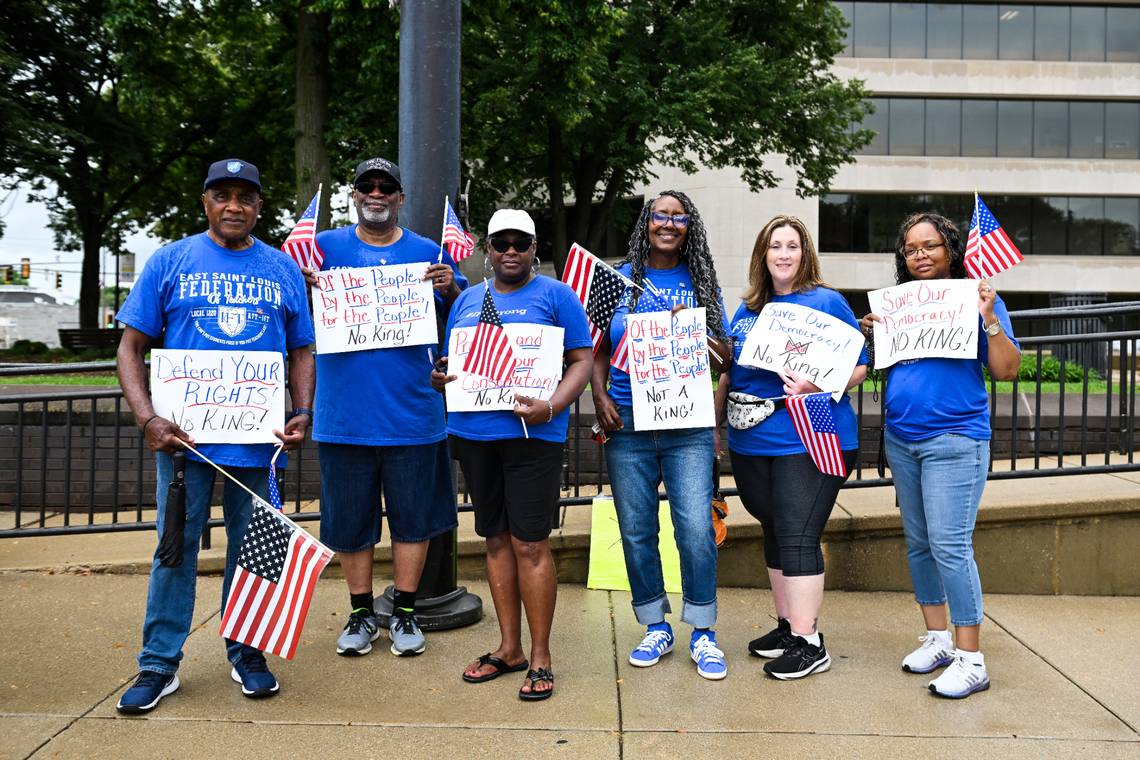

Cuts to safety net programs
East St. Louis Federation of Teachers Local 1220 Union President Terry Turley said that in addition to education cuts, he was also protesting on Saturday against possible Medicaid cuts due to the impact they could have on students and their families.
The reconciliation package that Trump and the Republican-controlled Congress named the "One Big Beautiful Bill Act" would reduce spending on the public health insurance program in part by freezing the healthcare provider taxes that help fund it. The package narrowly passed the House and remains under consideration in the Senate.
"That goes a long way to maintaining their health and allows them to keep their attendance up in schools, which has a direct impact on their ability to focus and learn," Turley said.
A pair of retired friends who met working in a union for carpenters said they were worried about the possibility of cuts to another safety net program: Social Security Patrick Hall, a native of the metro-east who moved to Thailand two years ago, and Michael Bollmann, from Red Bud, attended Belleville's protest together.
"It'll mean I'm gonna have to go back to work in order to live," Hall said regarding any cuts to the federal benefits program.
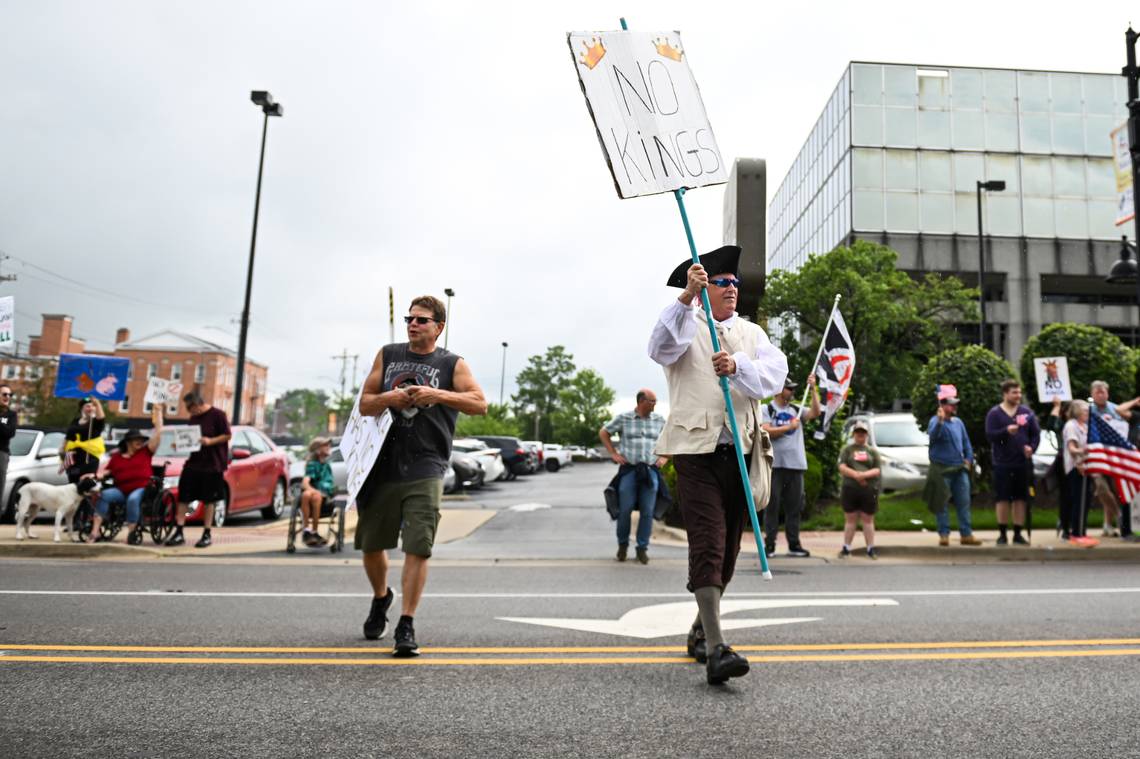

Immigration enforcement actions
Several protesters also noted their disapproval of U.S. Immigration and Customs Enforcement actions under the Trump administration in interviews and through their signs, with messages such as "ICE melts under resistance." People in the country legally have been taken into custody and deported in recent months , in violation of the law and a court order.
That can happen to anybody," said Rachel Gossett, a protester from O'Fallon, regarding the arrests. "If they can do it to you, they can do it to us.
Outten, the math and science teacher, said it's worrying Hispanic students and families in District 189.
"They come to school fearful," she said. "… They came here for a reason. I've heard some of their stories and to think that my babies may go back to that, it's not OK."
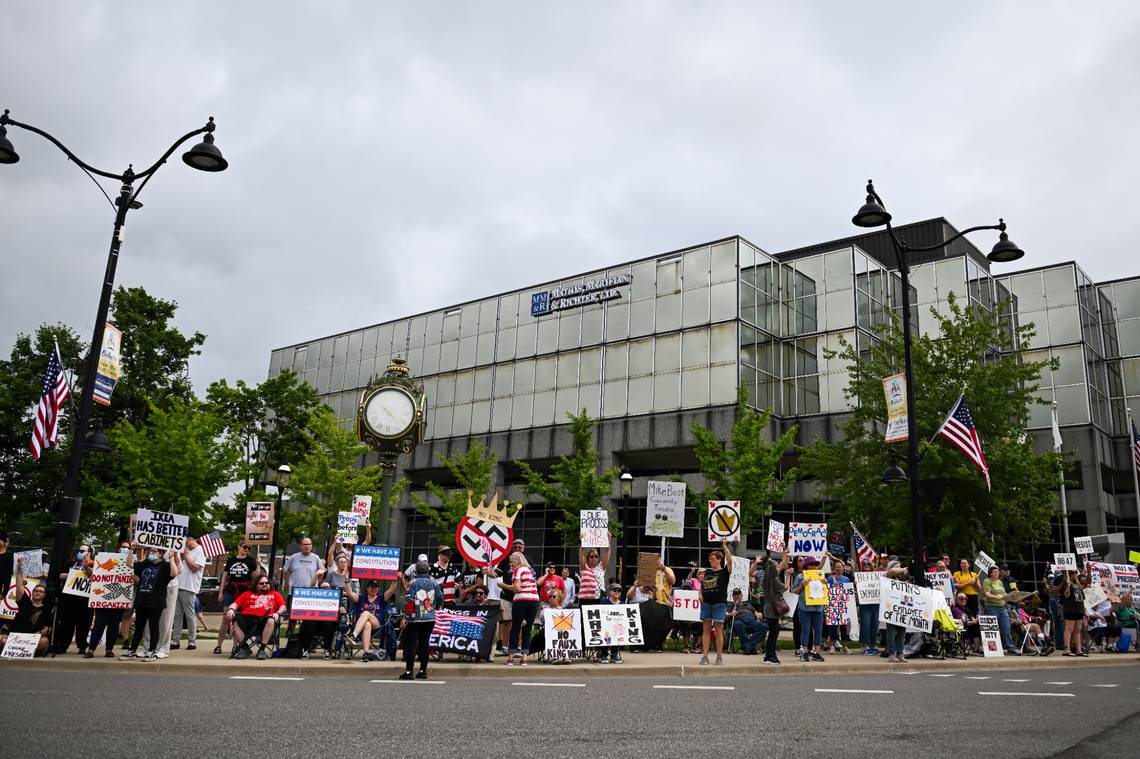

Cynthia Roller, an East St. Louis English language arts teacher who attended Belleville's protest, said the anxiety has touched her family, too. She has relatives in the metro-east who became U.S. citizens after they were adopted from Guatemala. Roller said they now worry they'll have to prove it.
"They shouldn't have to worry about whether or not someone's going to snatch them up because their skin is brown," Roller said.
Belleville protester Alex Enyart said he thinks the ICE expansions, as well as the recent federalization of the National Guard in response to protests in Los Angeles, are "the epitome of big government," a concept that Trump and most conservatives say they oppose.
"This is an increase in federal power. ... It's a direct contradiction to what he says he wants," said Enyart, a Belleville lawyer who works on immigration and criminal cases.
More camaraderie
Hall and Bollmann, the retired carpenters, said they think the nationwide day of protesting resulted in more camaraderie among individuals who oppose Trump, and it may motivate them to keep organizing.
"People are overwhelmed," Hall said. "... They need this sense of community so they don't get discouraged and give up and think it's hopeless. When people come together like this, it encourages people to stand up to it. … It's becoming a movement."
Scott, the union staffer, agreed.
"It shows that there are a lot of us and if we stick together, we can make our voices known and we can show that you can't just come in and uproot our lives without expecting us to fight back," he said.
"I saw leading up to this a lot of people being scared to come out or afraid of what was going to happen. And I think if you look around at what is happening here in the Belleville Square and I'm sure is happening at other kinds of protests today, we're here and we're mad, but also there's a lot of joy."
BND intern Bruce Darnell contributed information to this report.
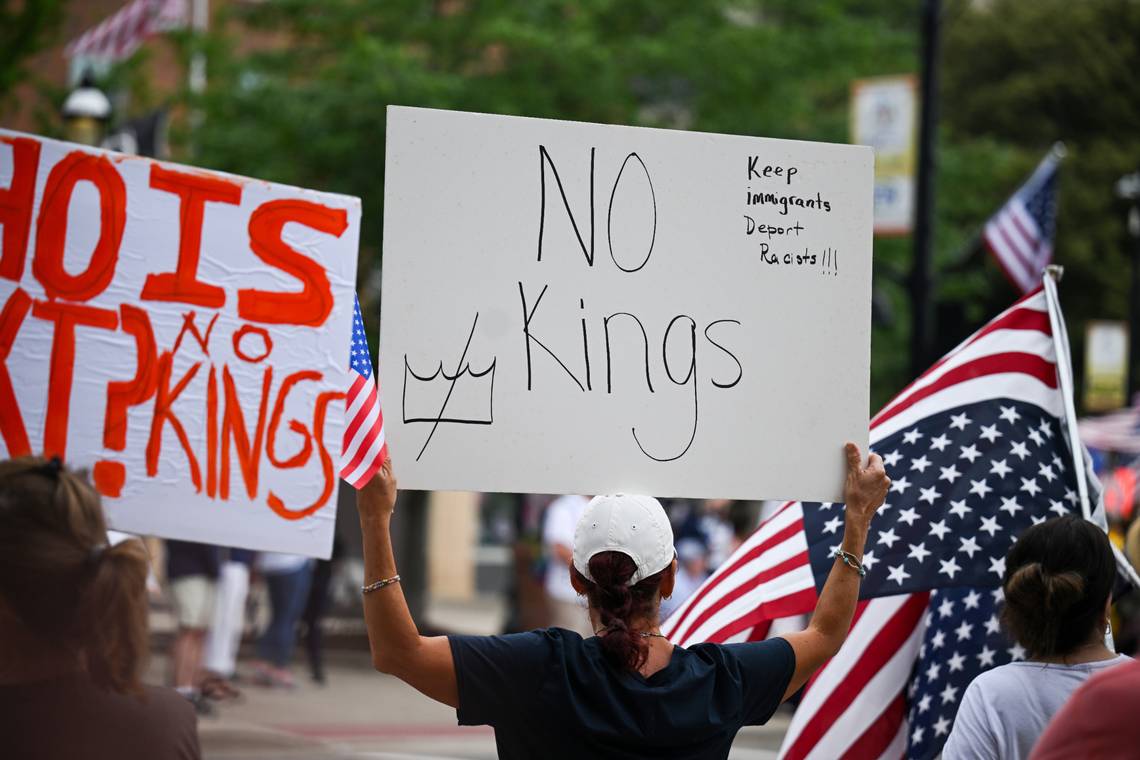

 The latest local, national and international news delivered every weekday morning.
The latest local, national and international news delivered every weekday morning.


0 Komentar